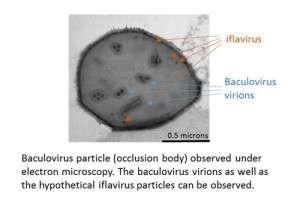Viruses hitch a ride to greater infectivity in insects

An international research team including scientists from Spain, Mexico and the Netherlands have found evidence of a previously unknown interaction between viruses.
Scientists have discovered evidence of one virus parasitising another, improving its infectivity, or ability to enter, survive and multiply in a host. Specifically, the iflavirus hitchhikes on the back of the baculovirus, a virus used since the 1940s as the basis for biological pesticides in crop fields, meaning the work has potential implications in plague control and ecology. Their study was published in PeerJ in March.
By hitching a ride, the iflavirus essentially 'upgrades' its viral transmission from vertical (from mother to embryo) to horizontal (peer to peer, often killing the host), while also remaining in an infectious state for longer, protected within the host virus' occlusion body.
But it is not all gain: while this interaction results in increased environmental persistence and transmission opportunities for the iflavirus, it has also been observed to reduce the pathogenicity of the baculovirus. Salvador Herrero, genetics professor at the Universitat de València (University of Valencia, UV) and the study coordinator, explains: "The efficiency of the baculovirus […] can be compromised by the presence of the parasite virus".
The prevalence of this interaction in nature is as yet unquantified, though many insects are known to become infected by baculoviruses, including many worms, and crop and woodland plagues.
The research began with the observation that, when an insect becomes infected with the baculovirus, it also shows high levels of infection with the iflavirus. Analysis of the initial baculovirus inoculum revealed that the parasitic iflavirus was also present. A series of experiments were then conducted to confirm this virus association. Using microscopy scientists were able to observe the presence of iflavirus-sized particles inside the baculovirus.
The experiments revealed, among other things, that when the iflavirus is hitching a ride on the baculovirus, it is much more resistant to high temperatures and ultraviolet light (solar radiation), increasing its persistence and therefore opportunity to produce new infections in the field.
At the UV the research was carried out by scientists in the Biotechnological Plague Control group at its Interdisciplinary Research Structure in Biotechnology and Biomedicine (ERI-Biotecmed). Led by Salvador Herrero, work focuses on the study of the molecular mechanisms regulating the interactions between insects and their viral and bacterial pathogens with a view to improving their use in plague control.
More information: Agata K. Jakubowska et al. Iflavirus increases its infectivity and physical stability in association with baculovirus, PeerJ (2016). DOI: 10.7717/peerj.1687
Journal information: PeerJ
Provided by Asociacion RUVID



















